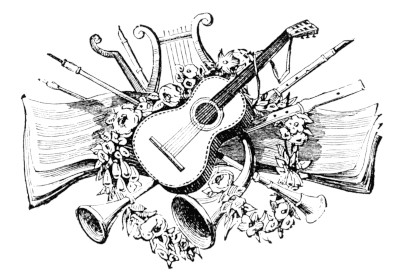Claude Debussy? Maurice Emmanuel? Léon Vallas? Apocryphal?

Question for Quote Investigator: Language is inadequate for conveying some deep emotions while music can arouse sensations and passions that are beyond words. Here are two versions of this sentiment:
- Music begins where words leave off
- Where words cease, music begins
Many people have been credited with this adage including the famous French composer Claude Debussy. Would you please explore the linkage to Debussy?
Reply from Quote Investigator: This is a large topic, and this article will focus on Claude Debussy’s use of the expression. A separate article located here provides an overview. Note that Debussy did not coin this adage.
Currently, the earliest match located by QI appeared in a July 1835 essay by Henry Russell Cleveland titled “The Origin and Progress of Music” in “The New-England Magazine”. Boldface added to excerpts by QI:1
Music begins where language ends; it expresses thoughts and emotions, to which speech can give no utterance; it clothes words with a power which language cannot impart.
Early in his career Debussy was influenced by the works of German composer Richard Wagner. Twice he traveled to the Festival Theatre in Bayreuth which was specifically designed to host performances of Wagner’s operas. Yet, over time he became disenchanted. Debussy employed the adage under examination after returning from Bayreuth with a changed perspective according to the 1933 biography “Claude Debussy: His Life and Works” by Léon Vallas:2
In October 1889, when the last pilgrimage to Bayreuth had destroyed his faith in Wagner, Debussy made the following statement: ‘I do not feel tempted to imitate what I admire in Wagner. My conception of dramatic art is different. According to mine, music begins where speech fails. Music is intended to convey the inexpressible. I should like her to appear as if emerging from the shadowy regions to which she would from time to time retire. I would have her always discreet.’
The biography of Debussy by Vallas first appeared in French in 1926. The book included the original French version of Debussy’s remarks:3
« Je ne suis pas tenté d’imiter ce que j’admire dans Wagner. Je conçois une forme dramatique autre : la musique y commence là où la parole est impuissante à exprimer; la musique est faite pour l’inexprimable; je voudrais qu’elle eût l’air de sortir de l’ombre et que, par instants, elle y rentrât; que toujours elle fut discrète personne. »
Vallas stated that these remarks were reported by Maurice Emmanuel in his book ‘Pelléas’. The full title of this book according to WorldCat is “Pelléas et Mélisande de Claude Debussy: étude historique et crititque, analyse musicale”, and the publisher is Mellotteé of Paris. Catalogs list several different dates of publication: 1919, 1920, and 1925. The dates are enclosed in brackets indicating uncertainty. QI has not verified the existence of this quotation within Emmanuel’s book.
Below are additional selected citations in chronological order.
In 1958 a Kenosha, Wisconsin newspaper printed a comment from the local symphony director:4
Quoting Debussy, he said: “Music is for the expression of things that cannot be expressed in words. Music begins where words fail.”
In 1972 Professor of Music J. Merrill Knapp of Princeton University published “The Magic of Opera” within which he discussed Debussy:5
During these years he was constantly searching for a possible opera libretto but could not find the right vehicle for his ideas. He is quoted as saying: “I am not tempted to imitate what I admire in Wagner. I conceive dramatic form differently; music begins where words are powerless to express.”
In 2003 the compilation “Notations: Quotations on Music” edited by Sallye Leventhal included the following entry:6
Music begins where words are powerless to express. Music is made for the inexpressible. I want music to seem to rise from the shadows and indeed sometimes to return to them.
—Claude Debussy
In conclusion, there is substantive evidence that Claude Debussy employed the adage in 1889. The attribution and year appeared in a 1926 biography of Debussy by Léon Vallas. Yet, Debussy did not originate this saying which was already circulating many years earlier in 1835.
Image Notes: Grouping of musical instruments including a guitar and lyre. Public domain image from the 1883 book “The Universal Self-Instructor”.
Acknowledgement: Great thanks to Terry Teachout whose inquiry led QI to publish a set of articles on this topic. Teachout asked about the attribution of the phrase “Where words leave off, music begins” to Heinrich Heine. Thanks also to twitter discussants David Wright, Cameron Wood, Joe Weber, and Amy Alkon.
Update History: On March 26, 2025 the format of the bibliographical notes was updated.
- 1835 July, The New-England Magazine, Article: The Origin and Progress of Music: No. 1, Author not listed, (1844 book claims author is Henry Russell Cleveland), Start Page 58, Quote Page 59 and 60, Eastburn’s Press, Boston, Massachusetts. (Google Books Full View) link ↩︎
- 1933, Claude Debussy: His Life and Works by Léon Vallas, Translated from the French by Maire and Grace O’Brien, Chapter 6: Before ‘Pelléas’: The ‘Quartet’ and the ‘Proses Lyriques’ (1892-9), Quote Page 84, Oxford University Press, London. (Verified with scans) ↩︎
- 1926, Debussy (1862-1918) by Léon Vallas, Quote Page 68, Librairie Plon, Paris. (Google Books Snippet Match; quotation is visible in two snippets; this citation has not been verified with hardcopy) ↩︎
- 1958 September 26, Kenosha Evening News, Schubert Club Members Hear Pianist, Talks By Monfils Cailliet, Quote Page 6, Column 1, Kenosha, Wisconsin. (Newspapers_com) ↩︎
- 1972, The Magic of Opera by J. Merrill Knapp (Princeton University), Chapter 12: French Opera, Quote Page 238, Harper & Row, New York. (Verified with scans) ↩︎
- 2003, Notations: Quotations on Music, Edited by Sallye Leventhal, Quote Page 53, Barnes & Noble Books, New York. (Verified with scans) ↩︎